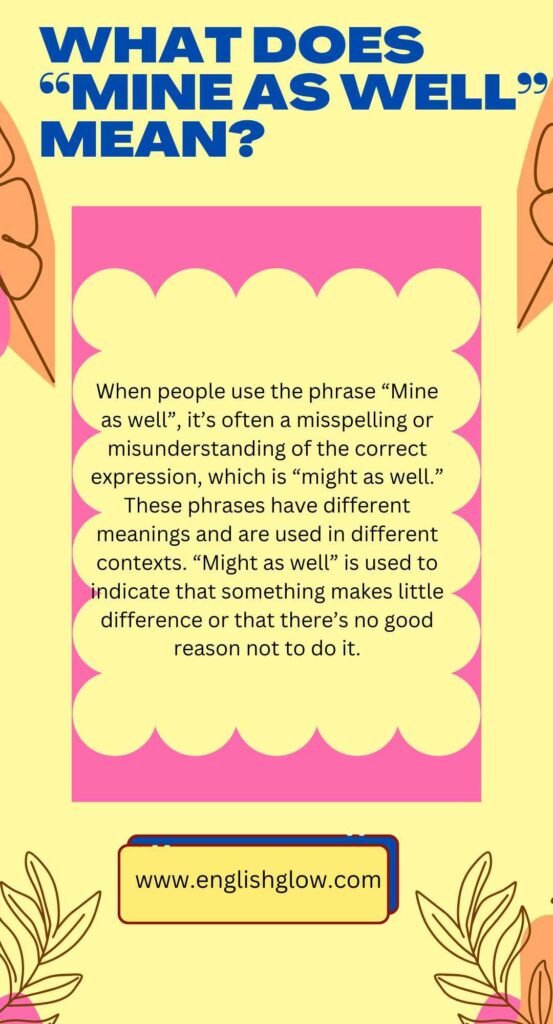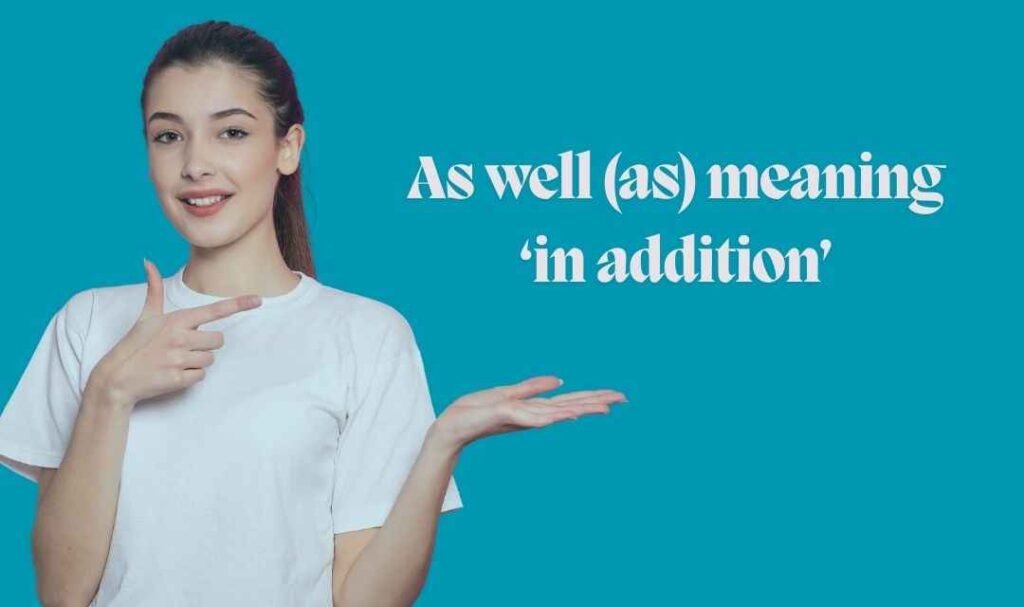When we use “mine as well,” we are typically talking about something that belongs to the speaker or me in addition to something else. For example, if someone says, “My favourite food is curry,” and I agree, I might respond with “mine as well.” This means that curry is my favourite food too. The phrase is often used in informal conversation when someone is trying to say “too” or “also.” However, it’s important to note that “mine as well” is commonly misunderstood, and in many cases, people mistakenly use it instead of “might as well.”
“Might as well” has a different meaning. It implies that a certain action or decision is a reasonable choice given the current circumstances. For example, if you’re already going to spend time or money on something, you might as well take a particular route or make a specific decision. For instance, an ad campaign for tyres might say, “If you’re going to buy tyres, you might as well buy them from Midas.” Here, the phrase means that since you’re already going to spend the money, it’s a good idea to buy from this specific company.
A common misspelling is when people use “mine as well” instead of “might as well.” While the two sound similar in spoken English, they have very different meanings. “Might as well” is the correct phrase to use when something seems like the best or most sensible decision in a given situation. For example, if Bob and John are having a meeting downtown, Bob might say, “Since we’re here, we might as well have lunch at that restaurant.” This means that since they’re already in the area, it’s a good idea to stop for lunch.
Another example: Imagine you’re considering whether to go on a tour of Napa Valley. You’re not highly motivated but have no other plans. In this case, you could say, “We might as well go on the tour.” This shows that while it’s not an exciting option, it’s reasonable and doesn’t require any extra effort. This is how “might as well” is used to suggest a decision when there are no better alternatives.
In summary, “mine as well” refers to something shared with the speaker or me, while “might as well” suggests an action or decision that is reasonable in the given circumstances. Both phrases may sound similar but carry completely different meanings in English conversation.
What does “mine as well” mean?
When people use the phrase “Mine as well”, it’s often a misspelling or misunderstanding of the correct expression, which is “might as well.” These phrases have different meanings and are used in different contexts. “Might as well” is used to indicate that something makes little difference or that there’s no good reason not to do it. For example, if you’re considering asking someone a question, you might say, “We might as well ask her.”On the other hand, “Mine as well” uses the first-person possessive pronoun “mine” to show that something belongs to the speaker. For instance, if someone says, “My legs are aching after the walk,” you could respond, “Mine as well,” meaning that your legs are also aching. This is how “mine as well” expresses belonging or possessionIn a conversation, “Mine as well” means “belongs to me too,” while “might as well” means “there’s no reason not to” go ahead with something. For example, if you’re at a restaurant, and someone is sharing wine, you might say, “Mine as well,” as you hold up your wine glass for the waiter to pour. This shows you also want some wine.It’s a common mistake to mix up these phrases, but understanding the correct usage depends on the context and grammar. “Mine as well” talks about ownership or possession, while “might as well” is used when something is a reasonable option.
you might enjoy :Was There or Were There? Unlock the Crucial Grammar Rule
might/may as well
The phrase “might as well” is often used when suggesting that something should be done because there is no better option or it makes sense in the current situation. For example, if you’re already outside, someone might say, “We might as well start walking,” since there’s no good reason to wait. The phrase can also be used when the same result is expected, such as when a party is dull. You could say, “I might as well have stayed home,” because attending or staying at home would feel the same.
A real-life example could be from a recent article by Karissa Waddick in USA TODAY, where she described how two areas in separate towns seem vastly different. In a place like Chatsworth, Ga., with a small population, compared to a large city like Los Angeles, the experience might feel like being on another planet. This reflects how you might say, “It feels like I might as well live somewhere else,” to explain how contrasting two places can feel.
In everyday use, people often say, “I might as well paint the bedroom myself,” when no one else is going to do it. This shows that the action is worth doing since no help is available. Similarly, if there’s not much on TV, you might say, “We might as well go out,” because staying home wouldn’t offer anything better.
In popular culture, Luke Skywalker toys from Hasbro were once stiff, like ceramic dolls, but modern Spider-Man figures from Marvel Legends are now flexible and can pose like Zoolander. This could lead someone to say, “We might as well buy the new Spider-Man figure since it’s improved.” This phrase often illustrates that a choice is sensible when other options don’t seem appealing.
As well (as) meaning ‘in addition’
When we use the phrase as well, it means also, too, or in addition. It’s typically placed at the end of a clause to add more information. For example, if you say, “I’m looking forward to seeing you and meeting your wife as well,” you are adding more details about what you’re excited for. This makes the sentence clearer and more complete.
In contrast, as well as works as a multi-word preposition, meaning “in addition to.” This phrase is often used to show that one thing is done or included in addition to another. For instance, “She invited Jill as well as Kate” means both Jill and Kate were invited. Similarly, “When they go to Austria, they like walking as well as skiing,” shows that both activities are enjoyed together.
Using as well and as well as in writing helps to connect ideas and show in addition to something else, giving your sentences more depth and detail.
you might enjoy : It’s Called vs. It Called: The Key Difference You Must Know
Might as well and may as well
Might as well and may as well are often used informally when something is worth doing because there are no other things happening. Both phrases imply that the action being considered isn’t the best option but is the most logical given the circumstances. Might as well is generally more common in everyday speech.
For example, if you find yourself with an unfinished task and no one else is helping, you might say, “I might as well paint the bedroom myself; no one else is going to do it.” It’s a practical decision based on the situation at hand.
Similarly, if there’s not much on TV tonight, you might say, “We may as well go out tonight since there’s nothing better to do.” It suggests that, with no exciting alternatives, going out is a reasonable choice.
As well
When we talk about “as well”, it usually means “also” or “in addition.” It can be used when you want to mention something extra or something that is a good idea. For example, if you’re going to the bird park, it’s probably a good thing to take a good camera with you to capture beautiful photos. Here, taking a camera is an extra action that makes sense in that situation.
Sometimes, we use the phrase “just as well” to express that something worked out for the better, even if it wasn’t planned. For instance, it’s just as well we didn’t go to the lecture because it ended up being cancelled. In this case, it turned out to be a good idea not to go, since the event didn’t happen anyway.
In both uses, “as well” can mean that an additional action or decision is either a good thing or makes sense based on what happens. So whether you’re visiting a park or avoiding a lecture, the use of “as well” fits the context.
FAQ
Is it “might as well” or “mind as well”?
The correct phrase is “might as well.” The phrase “mind as well” is incorrect. “Might as well” is used to suggest that doing something is a good idea or the only reasonable option under the circumstances.
Is “might as well” grammatically correct?
Yes, “might as well” is grammatically correct. It is used to indicate that one option is just as good as another, or that there’s no better alternative. For example: “We might as well go to the party since we’re already dressed up.”
How do you use “might well” in a sentence?
“Might well” is used to suggest that something is likely or possible. For example: “He might well be the best player on the team.” It adds a level of probability to the sentence.
How do you use “might as well have” in a sentence?
“Might as well have” is used to express regret or the idea that one action was no better than another. For example: “We might as well have stayed home because the concert was canceled.” This suggests that staying home would have been just as effective or better.
“Mine as well,” “Might as well,” or “Mind as well” – Which is correct?
“Might as well” is the correct phrase. It means that it would be a good idea to do something since there’s no better alternative. “Mine as well” and “mind as well” are common mistakes or mishearings of the correct phrase.
“Mine as well,” “Might as well,” or “Mind as well” – What’s the meaning?
“Might as well” means “it makes sense to do this” or “there’s no reason not to.” For example, “We might as well go now if we’re ready.” The phrases “mine as well” and “mind as well” are incorrect and do not carry a specific meaning.
“Mind as well” or “Might as well” – Which one should I use?
You should use “might as well.” “Mind as well” is incorrect, likely a misunderstanding of the actual phrase. Stick with “might as well” to express that something is a reasonable course of action.
“Mine as well,” “Might as well,” or “Mind as well” – What is the origin?
The phrase “might as well” comes from older English expressions and has been in use for centuries to suggest that one course of action is as good as another. Over time, it became a common idiomatic expression. Mishearings like “mine as well” or “mind as well” have no historical basis and stem from confusion over the pronunciation.
“Mine as well,” “Might as well,” or “Mind as well” – Can you provide examples?
Correct usage: “We might as well leave now; there’s nothing more to do.”
Incorrect usage: “We mine as well leave now.” or “We mind as well leave now.” Both of these examples are misunderstandings of “might as well.”
You might enjoy reading: Early This Month or Earlier This Month? Discover the Right Answer!





